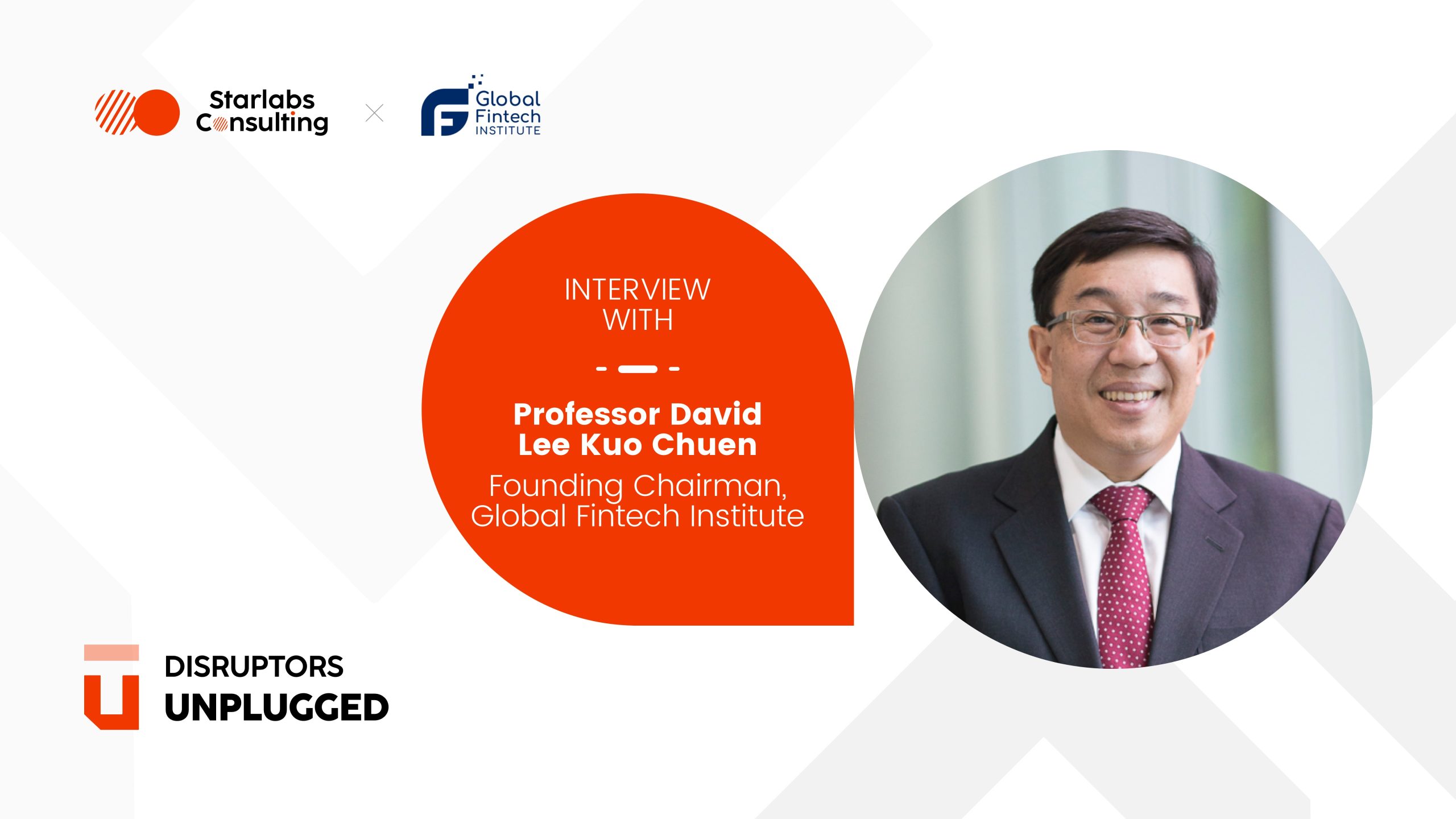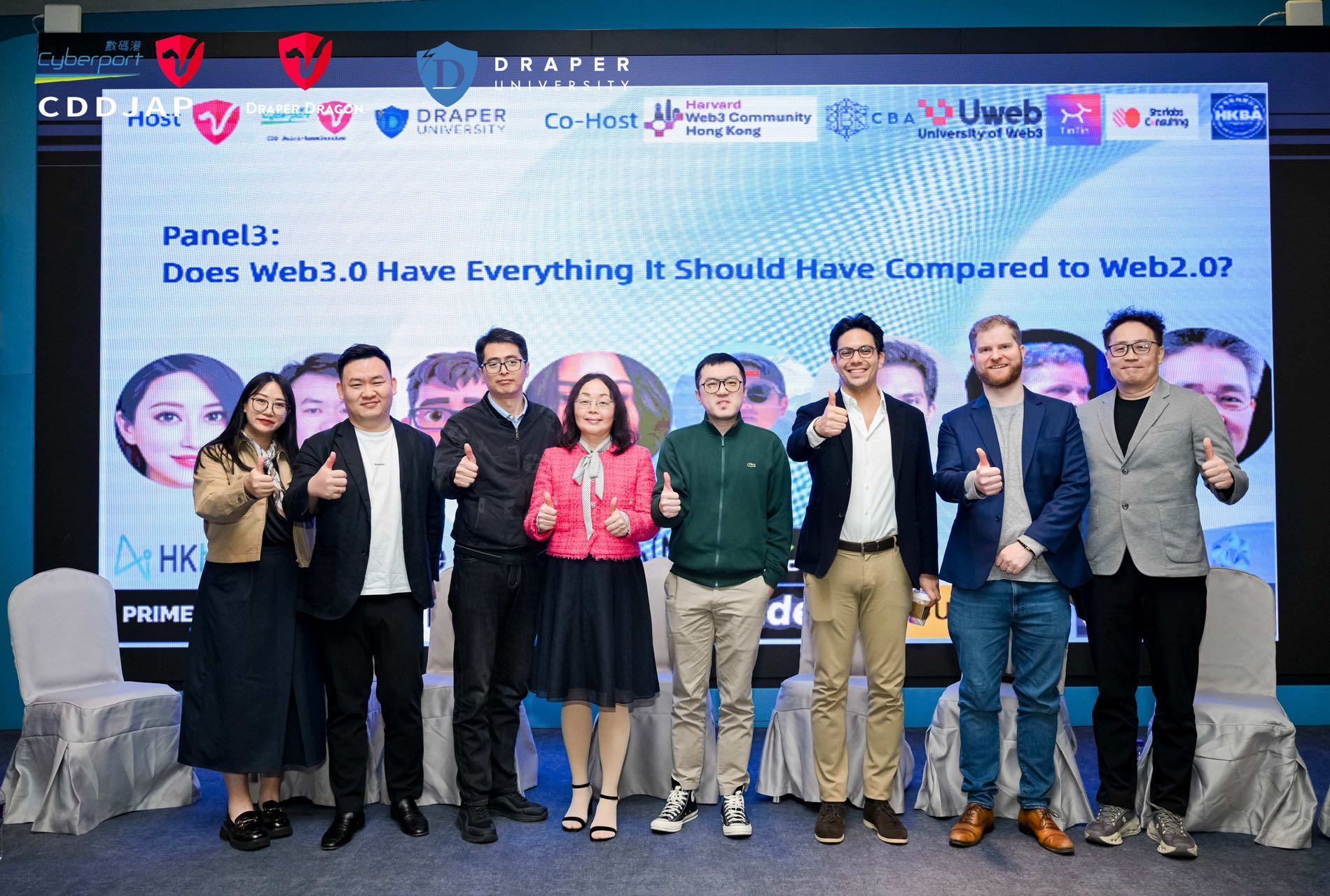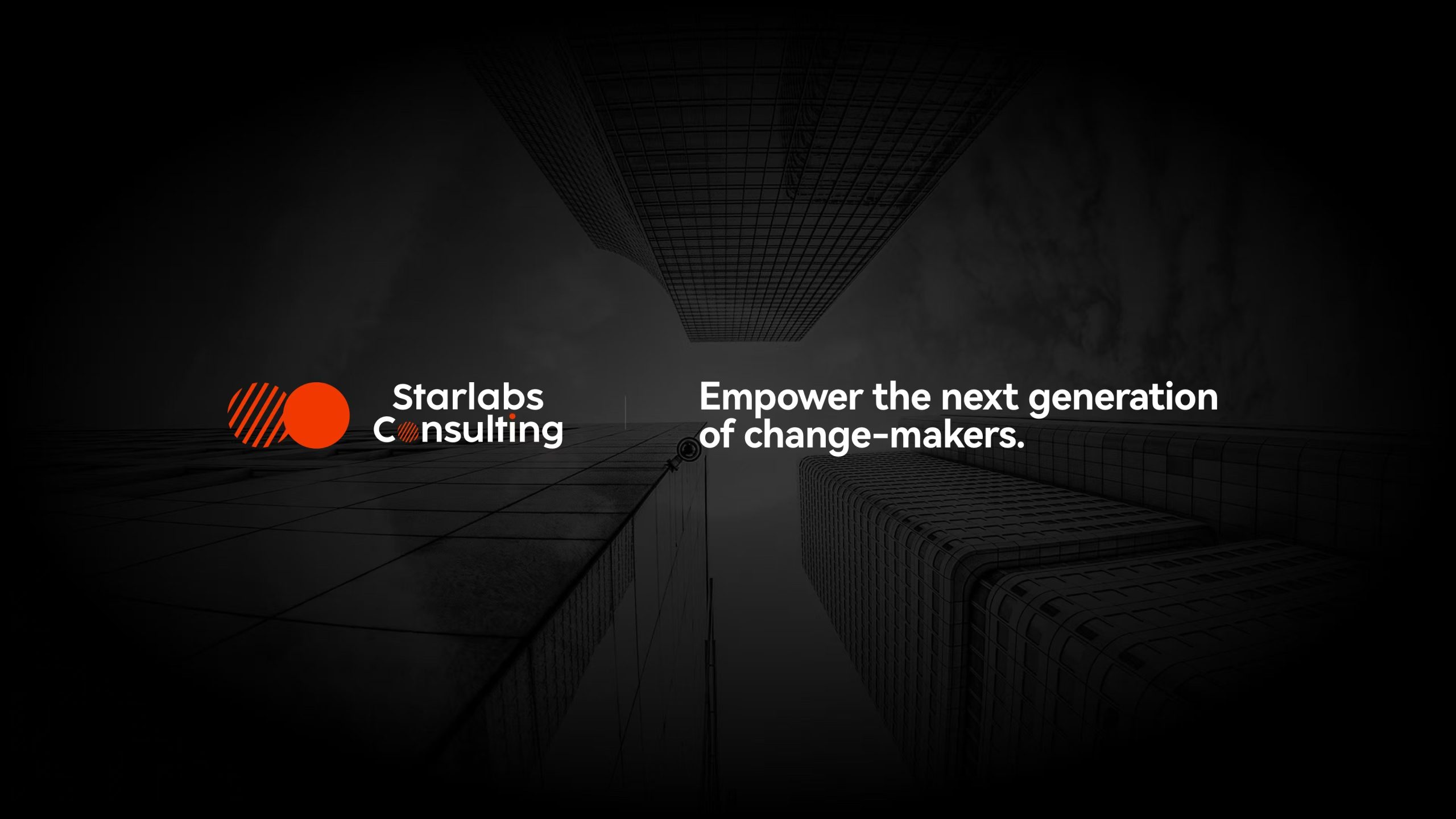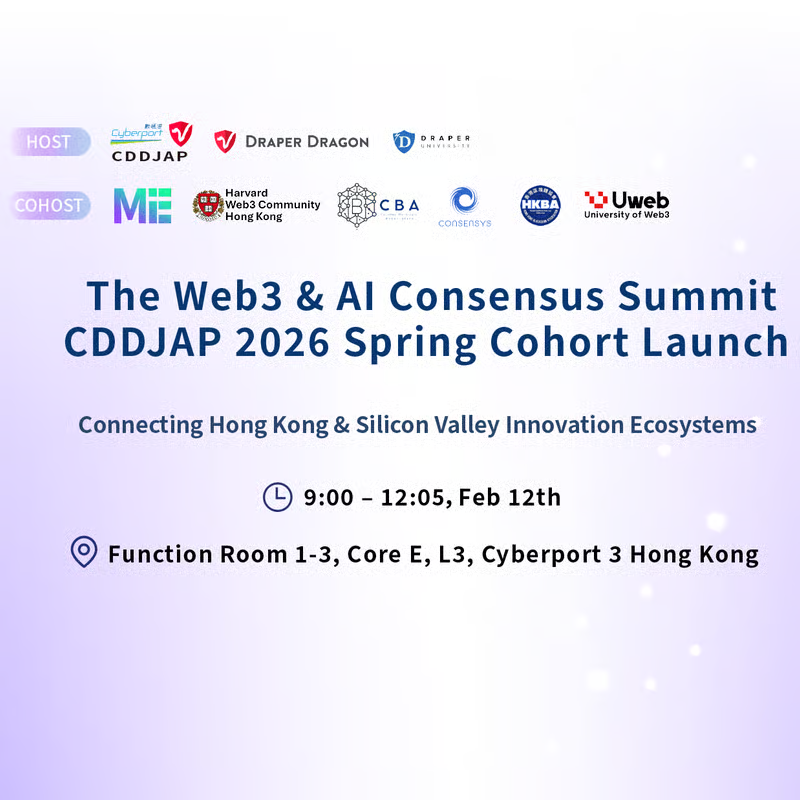
Bridging the Global Fintech Talent Gap: An Interview with Professor David Lee Kuo Chuen, Founding Chairman of the Global Fintech Institute
In March 2025, Binance announced its sponsorship and strategic partnership with the Global Fintech Institute (GFI), reinforcing a shared commitment to advancing fintech education, technical specialization, and innovation worldwide. As part of this collaboration, Binance pledged to fund more than 500 scholarships for GFI’s newly launched program, Foundation in Crypto Regulation and Compliance.
Binance CEO Richard Teng with Professor David Lee, founding chairman for Global Fintech Institute.
Against the backdrop of rapid technological disruption, the need for a new generation of fintech talent—equipped with interdisciplinary expertise and ethical leadership—has never been greater. Yet the supply of qualified professionals continues to lag behind accelerating industry demands.
In this edition of Disruptors Unplugged, Starlabs Consulting speaks with Professor David Lee Kuo Chuen, Founding Chairman of GFI, to explore the current state of fintech education, the structural gaps that persist, and how GFI is working to build a more resilient and future-ready fintech ecosystem.
Professor Lee also offers his perspectives on broader market dynamics, including the impact of trade policies on the crypto sector, the evolving role of stablecoins in cross-border commerce, and Bitcoin’s dual nature as both a hedge asset and a volatile investment vehicle.
Guest Profile
Professor David Lee Kuo Chuen is the Founding Chairman of the Global Fintech Institute (GFI) and a Professor of Fintech and Blockchain at the Singapore University of Social Sciences (SUSS). He is also a Visiting Professor at the National University of Singapore (NUS) and serves on the founding council of the British Blockchain Association. Professor Lee is the Editor-in-Chief of both the Journal of Fintech and the Annual Review of Fintech.
A globally recognized blockchain scholar and industry thought leader, Professor Lee specializes in the development of Web3 and AI-driven applications. He is a co-founder of the Blockchain Association Singapore (BAS), the Blockchain Security Alliance, and the Global Web3 Association. His advisory roles include serving as an expert on Central Bank Digital Currencies (CBDCs) for the Asian Development Bank, Vice President of the Economic Society of Singapore (ESS), crypto advisor to the Asian Institute of Digital Finance (AIDF) at NUS, and expert advisor to the Inclusive FinTech Node (NiFT) at SUSS.
In addition, Professor Lee sits on the boards of several publicly listed companies in Singapore and acts as an angel investor and limited partner across a range of blockchain, Web3, inclusive finance, and AI innovation projects. He is also a Senior Advisor and Investment Committee Member at Artichoke Capital.
On Tariff Wars, Bitcoin and the Crypto Market
Starlabs: The Trump-era tariff policies have triggered global economic uncertainty and volatility across capital markets. Theoretically, cryptocurrencies—being non-sovereign stores of value—should be immune to such trade measures. Why, then, has the crypto market recently mirrored the movements of U.S. equities and appeared equally affected by U.S. economic policy?
Professor David Lee: Cryptocurrencies, particularly Bitcoin, have increasingly become essential components of institutional portfolios as high-risk, high-reward assets. As such, in the short term, they tend to exhibit positive correlation with U.S. equities—especially tech stocks on the Nasdaq. During episodes of market panic or liquidity tightening, institutions often reduce exposure to volatile assets across the board, including both equities and crypto, to mitigate losses or fulfill redemption requests.
However, over a medium-to-long-term horizon, the correlation tends to reverse. The underlying logic is that when risk sentiment deteriorates to extreme levels—amid regulatory uncertainty or systemic liquidity stress—institutions prioritize divesting from traditional assets that are more liquid, more highly valued, and deeper in market depth, such as U.S. equities. Bitcoin, in contrast, due to its decentralized, censorship-resistant, and non-sovereign characteristics, often becomes a preferred vehicle for capital seeking a “margin of safety.” While crypto and equities may fall in tandem, Bitcoin frequently leads in recovery when trust in traditional systems breaks down—thanks to its role as an alternative value reservoir.
Starlabs: In light of ongoing trade disputes and geopolitical decoupling, some countries have seen disruptions in USD-denominated trade settlements. Does this dynamic create a real adoption opportunity for cryptocurrencies—particularly stablecoins? Could this drive capital inflows into the crypto sector?
Professor David Lee: Absolutely—and that’s a very accurate observation. Stablecoins such as USDT and USDC have become the most efficient and lowest-trust-cost instruments in today’s global payment ecosystem. This is not merely theoretical—it is based on empirical comparison. When benchmarked against Central Bank Digital Currencies (CBDCs) and consortium-based cross-border settlement systems, stablecoins outperform in terms of cost, settlement speed, and ease of conversion.
In emerging markets—such as Argentina, Turkey, and parts of Africa—stablecoins offer near-instant, low-premium access to dollar liquidity, which is a game-changer for both individuals and enterprises.
We often talk about “financial inclusion,” but in practice, many small and micro enterprises—and cross-border freelancers—remain excluded from traditional financial systems. Stablecoins, when combined with decentralized finance (DeFi), effectively democratize access to global liquidity. One doesn’t need a bank account—just a digital wallet—to receive payments, send funds, and even access capital or earn yields through on-chain protocols. This isn’t about replacing banks; it’s about building a parallel system that doesn’t rely on them. For many underbanked participants, this could be their first meaningful entry into the capital markets.
Starlabs: How do you reconcile the tension between Bitcoin’s role as a safe-haven asset and its notorious price volatility? Do you see its hedge value strengthening over time?
Professor David Lee: This is a common misperception. The term “volatility” is often misapplied because people compare Bitcoin against fiat currencies without recognizing the inherent depreciation of fiat itself. When fiat currencies are continuously losing purchasing power, it’s not Bitcoin that’s unstable—it’s the fiat.
Consider this: the U.S. M2 money supply has nearly doubled over the past decade. That means each dollar buys substantially less than it did ten years ago. Bitcoin, on the other hand, has a hardcoded maximum supply of 21 million units. It is the world’s first truly scarce digital asset. Over the long term, Bitcoin preserves purchasing power better than any fiat currency. It can arguably be viewed as the digital-age equivalent of gold.
Volatility does not equate to risk. Much of Bitcoin’s price fluctuation stems from its early-stage market structure and the evolving profile of its participants. Yet the long-term trajectory is clear: Bitcoin functions as an inflation hedge, an asset outside the traditional financial system, and a liquidity refuge in times of global uncertainty.
On Fintech Education
Starlabs: What is the current state of global fintech education? Do you see this as a blue ocean opportunity for startups?
Professor David Lee: The fintech education landscape today faces two fundamental challenges: a severe mismatch between industry demand and educational supply, and a significant gap in ethical and professional standards.
In recent years, with the rapid emergence of technologies such as blockchain, AI, DeFi, CBDCs, Web3, and the metaverse, the market demand for interdisciplinary talent—individuals proficient in both technology and finance—has surged dramatically. However, the supply side of fintech education remains seriously inadequate.
Specifically, the industry’s demand for blockchain developers, AI model designers, DeFi risk management experts, and quantum security analysts continues to rise. Yet, most academic institutions and education providers around the world still focus predominantly on traditional finance and basic IT skills. For instance, financial education curricula often have slow update cycles and are unable to keep pace with fast-evolving fields like DeFi, NFTs, DAO governance, smart contracts, and data privacy protection.
Clearly, this presents a blue ocean opportunity for startups. Today, platforms such as Coursera, Udemy, and edX have emerged, offering a variety of short-term courses in fintech, blockchain, AI, and data analytics. However, these programs tend to emphasize technical competencies while largely neglecting critical areas such as ethics, professional practice, and industry standards.
For example, many developers focus heavily on technological innovation and market efficiency, often overlooking key ethical considerations such as user privacy, system fairness, and regulatory compliance. As technological innovation often precedes regulatory development, products built without a foundation in financial ethics and compliance may introduce a range of non-human-centric risks, including:
- Financial Speculation and Bubbles: Heightened potential for systemic risk and significant investor losses.
- Fraud and Money Laundering: Unregulated DeFi protocols and anonymous transactions create breeding grounds for illicit activities.
- Algorithmic Bias and Discrimination: AI and machine learning models may embed data biases, leading to unfair treatment of certain groups and exacerbating social inequality.
- Opacity and Non-Auditability: The complexity of DAO and DeFi governance structures may result in insufficient transparency and unmanageable systemic risks.
- “Skynet” Risk: In the future, deep integration of AI with fintech could lead to autonomous learning algorithms and uncontrollable trading systems, posing existential threats to financial system stability.
Against this backdrop, we believe the global fintech industry is undergoing a dual paradigm shift. On one hand, the evolution of regulatory frameworks is driving exponential increases in compliance-related operational costs. On the other hand, the enforcement of ethical regulatory structures—such as the European Union’s AI Act—is accelerating market demand for industry standards based on Ethical Algorithm Governance and Human-Centric Design Thinking.
In this new environment, the future of fintech education must center ethics, compliance, and governance as core modules. Education providers should guide learners to develop and deploy technologies that are fundamentally human-centric. Critical coursework should include AI ethics, blockchain governance, data privacy protection, anti-money laundering mechanisms, and transparency and auditability of decentralized systems.
As a global leader in fintech education, GFI is advancing these standards through its Chartered Fintech Professional (CFtP) certification and its partnership with the Flex.sg platform. CFtP holders are listed on Flex.sg and are awarded a Universal Trusted Credential (UTC) for fintech professionals, issued under the framework initiated by the United Nations Development Programme (UNDP).
In addition, GFI is positioned to collaborate with international institutions such as the IMF, World Bank, Financial Stability Board (FSB), and Bank for International Settlements (BIS) to jointly develop globally recognized ethical governance frameworks and professional practice guidelines for the fintech industry.
Leveraging its interdisciplinary think tank resources, GFI is actively building an empowerment framework anchored on three core modules:
- Algorithmic Ethics Assessment Matrix (including bias detection and explainability verification standards)
- Regulatory Technology (RegTech) Capability Maturity Model
- Responsible Financial Innovation Certification System (integrating dimensions such as digital financial inclusion and climate finance under ESG frameworks)
About The Global Fintech Institute (GFI)
Starlabs: Could you introduce GFI and its CFtP certification system?
Professor David Lee:
The Global Fintech Institute (GFI) is a Singapore-based, nonprofit, university-neutral fintech education institution dedicated to meeting the rising global demand for specialized fintech training and certification. Its core mission is to build a tri-sector international ecosystem connecting academia, industry, and regulators, providing seamless career pathways for cross-industry professionals and sustaining the diversity and vitality of the fintech sector.
GFI has established a global platform that links industry experts, academics, and regulatory bodies, delivering specialized and systematic educational programs. Through its flagship Chartered Fintech Professional (CFtP) and Chartered Fintech Associate (CFtA) certification systems, GFI aims to elevate industry standards and enhance the professional competencies of fintech practitioners.
Originally founded with the support of the Singapore University of Social Sciences (SUSS) and the Shanghai International Finance Centre (SIIFC) at Shanghai University of Finance and Economics, GFI now collaborates with leading institutions including the National University of Singapore (NUS), Singapore Management University (SMU), Nanyang Technological University (NTU), Murdoch University, and other universities across Europe and North America. Partnerships with institutions such as SUSS and SIIFC ensure GFI’s programs uphold high academic standards while maintaining a strong emphasis on practical application. GFI also publishes two highly regarded journals—the Journal of Fintech and the Annual Review of Fintech—with Nobel laureates serving as advisors.
The CFtP program is GFI’s flagship offering. It is a two-tiered, self-paced curriculum that bridges theoretical foundations with real-world applications:
- Level 1 covers two major modules:
- Finance—Economics, financial statement analysis, corporate finance, and investment management.
- Fintech—Data structures, algorithms and Python programming, big data and data science, AI and machine learning, as well as computer networks and cybersecurity.
- Finance—Economics, financial statement analysis, corporate finance, and investment management.
- Level 2 focuses on applied skills and professional practice, including:
Compliance and technology risk management, cloud computing, cybersecurity and quantum computing, blockchain programming and digital currencies, global fintech trends, business ethics and governance, and deep learning applications in finance.
Candidates who complete both levels and possess at least two years of fintech-related work experience will be awarded the CFtP certification, regarded as a gold standard within the industry.
For individuals with no prior background but aspiring to enter the fintech sector, GFI offers the CFtA program. It provides systematic foundational training to prepare candidates for the CFtP track. Applicants must be at least 18 years old with basic English proficiency. Graduates of the CFtA program are exempted from the undergraduate degree prerequisite for CFtP enrollment.
Starlabs: Tell us about GFI’s faculty.
Professor David Lee:
GFI’s faculty comprises professors from top universities, research scholars, fintech experts, and industry practitioners, all of whom bring both deep academic expertise and extensive real-world experience to the classroom. This ensures that the curriculum is both intellectually rigorous and practically relevant.
GFI maintains a wide network of partnerships with central banks, financial institutions, government agencies, law firms, audit firms, and fintech service providers. This enables continuous updates to course content in line with the latest industry trends and regulatory developments.
We have established the GFI Industry Fellowship Program, which connects seasoned fintech professionals with emerging talents, creating a powerful mentorship ecosystem to nurture the next generation of fintech leaders. CFtP holders are eligible to become Chartered Industry Fellows, offering them opportunities to share their knowledge and insights with the broader community.
Currently, GFI’s membership base exceeds 500 individuals and continues to grow.
Starlabs: Who are GFI’s key partners?
Professor David Lee:
GFI has built a strong network of global partners, spanning key regions such as Turkey in the Middle East, Cambodia in ASEAN, Australia, and 26 countries across Africa. Within China, we have active collaborations in cities including Xiamen, Chongqing, Tianjin, and Shanghai. These partnerships enable GFI to tailor its certification programs to local regulatory and technological environments, ensuring both relevance and cutting-edge content.
We also collaborate closely with multilateral organizations, policy think tanks, and industry associations—including the Brunei Institute of Leadership & Islamic Finance and The Financial Academy in Saudi Arabia—gaining access to the latest insights into global policy and industry developments.
GFI has established multiple specialized committees focusing on critical domains such as cybersecurity, compliance, wealth management and fintech, smart contracts and DAOs, and digital banking. These committees, composed of seasoned industry experts, are dedicated to setting new standards for emerging sectors and developing forward-looking curriculum content.
Furthermore, GFI is supported by over 20 corporate sponsors, including Binance and the Asia Pacific Exchange. These partners not only sponsor related initiatives but also provide internship opportunities for newly certified CFtP holders, helping to accelerate talent development across the fintech industry.
Starlabs: Who are the primary audiences that GFI targets for its training programs?
Professor David Lee:
GFI’s core target audiences include:
- Professionals from the Traditional Financial Sector
We provide advanced training for practitioners in banking, insurance, asset management, and other financial institutions, equipping them with expertise in blockchain, AI, DeFi, and digital payment technologies. For professionals engaged in compliance, risk management, and anti-money laundering (AML), GFI courses offer practical insights into integrating regulatory technology (RegTech) into daily operations to address new challenges posed by fintech innovations. - Technology and Data Specialists
For technical professionals aiming to transition into blockchain development, smart contract auditing, or AI-driven financial services, GFI offers practical training in blockchain programming, machine learning, cybersecurity, and big data analytics. - Fintech Entrepreneurs and Senior Executives
GFI provides fintech startup founders and C-level executives (such as CEOs, CTOs, and CFOs) with a systematic knowledge framework covering industry regulations, market entry strategies, and innovative business models. - Regulators and Policymakers
For central banks, financial regulatory bodies, and government agencies, GFI delivers deep expertise in areas such as digital asset regulation, DeFi governance, and central bank digital currencies (CBDCs). - Academic Researchers and University Students
GFI attracts scholars and graduate students from finance, economics, computer science, and data science who seek to advance their research in emerging fields such as Web3, AI, blockchain, and quantum finance. Additionally, GFI offers undergraduate and graduate students a professional certification pathway—starting with the CFtA and progressing to the CFtP—to gain recognized credentials for entering the fintech industry. - Professionals Seeking Career Transition into Fintech
GFI also offers structured learning pathways for professionals from adjacent industries—such as law, auditing, IT, and consulting—who aim to pivot into fintech. Through the CFtP certification, they can systematically build the necessary skills to transition successfully.
Starlabs: What are GFI’s key differentiators compared to other training and certification providers?
Professor David Lee:
GFI’s competitive advantages are reflected in several critical areas:
- Industry-Recognized Certification
Both the CFtP and CFtA certification systems are widely recognized by regulatory authorities and industry associations. Certified CFtP professionals are showcased on the Flex.sg talent platform—partially funded by regulatory bodies—and awarded a Universal Trusted Credential (UTC) for fintech professionals. This credential is recognized by international employers and central banks. (*The UTC framework was co-initiated by the United Nations Development Programme and the Monetary Authority of Singapore, with a white paper released in 2024.) - Balanced Emphasis on Theory and Practice
GFI’s curriculum covers the latest technological trends and integrates real-world case studies, helping participants acquire hands-on skills in frontier areas such as AI, DeFi, and blockchain. - Global Learning Accessibility
GFI supports remote learning and online examinations, enabling learners worldwide to access high-quality, professional fintech education anytime, anywhere.
———————————
About Starlabs Consulting
Starlabs Consulting is a global leader in strategic and marketing consulting for the Web3 industry. Founded in 2018, we specialize in delivering end-to-end solutions across strategic planning, financial advisory, PR and marketing, risk forecasting and management, regulatory and legal compliance, crisis management, and innovation research.
We are committed to helping visionary companies navigate complexity in their growth, marketing, and operations—empowering them to thrive in competitive markets. With deep Web3 expertise and an extensive global network, Starlabs Consulting is the trusted partner of choice for many of the world’s leading crypto exchanges. Our professional team is known for its strategic insight, execution excellence, and unwavering client commitment, earning us a strong reputation across the industry.
Website: https://www.starlabsconsulting.com/
About The Global FinTech Institute (GFI)
The Global FinTech Institute (GFI) is a non-profit think tank that fosters collaboration among regulatory bodies, corporations, and academic institutions. Headquartered in Singapore, GFI addresses challenges in the fintech landscape through research, whitepapers, and thought leadership discussions that shape policy and industry standards.
The flagship initiatives include the Chartered FinTech Professional (CFtP) and Chartered FinTech Associate (CFtA) certifications, which equip professionals with essential skills for the evolving fintech environment. They also lead the FLEX International Hub, a trusted, global digital platform that promotes innovation and information-sharing among key stakeholders.
GFI is dedicated to advancing a more inclusive and sustainable global financial system by supporting fintech standards and best practices. They empower stakeholders to innovate responsibly and integrate effectively into the global financial ecosystem.
Website: https://globalfintechinstitute.org/





